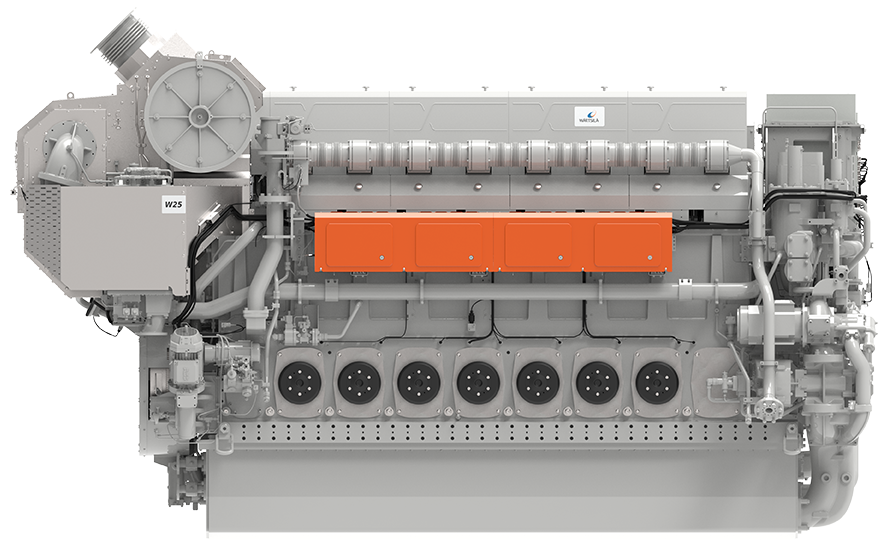
Ready for anything
With many uncertainties surrounding the choice of alternative fuels to achieve decarbonisation, projects are underway to ensure expensive marine engines have the flexibility to use a range of fuels
The technology group Wärtsilä says its new Wärtsilä 25 medium-speed 4-stroke engine’s modularity offers shipowners and operators maximised flexibility, while the engine’s efficiency and fuel economy deliver minimised emissions.
December 9, 2022
The engine is already capable of operating on diesel, LNG, or on either gas or liquid carbon-neutral biofuels and Wartsila says it can easily be upgraded to operate with future carbon-free fuels as they become available.
The flexibility of having different valve timing options is a key enabler for future fuels and emissions optimisation.
The Wärtsilä 25 is intended to be the first Wärtsilä engine to run on Ammonia as a fuel. This development is currently underway with a technology concept readiness slated for 2023, followed by planned product release soon thereafter.
When operating with natural gas, the engine is IMO Tier III compliant, as it also is with diesel when integrated with a Wärtsilä NOx Reducer (NOR) emissions abatement system. Furthermore, it is said to enable economically viable compliance with regulations such as the IMO’s CII and EEXI protocols that enter into force in 2023.
Meanwhile, classification society Bureau Veritas (BV) has awarded an Approval in Principle to Gas and Heat (GH), a company specialising in the design, construction and integration of liquefied gas handling systems both for marine and onshore installations, for its flexible solution for the transport of LNG and ammonia.
BV notes: “Through a thorough study, GH supported by the BV team demonstrated that IMO Type C cargo/fuel tanks made of austenitic steel with a special grade can transport both LNG and ammonia for sea-going and inland navigation.”
It adds: “While LNG is expected to be widely used this decade, alternative fuels are under scrutiny to ensure their safe and sustainable use in the future. At the same time, shipowners are becoming more and more focused on multi-fuel supply systems able to handle two or more different fuels. As part of their ambitions to develop innovative solutions to help the industry anticipate the next wave of alternative fuels, GH embarked on a study to identify possible options and develop solutions.”
GH has used austenitic steel with a special grade for LNG containment since its approval by Bureau Veritas in June 2022, as an “alternative material” with respect to the IGC and IGF Codes. The compatibility of this material with ammonia has been verified by a specific Stress Corrosion Cracking test performed by GH and then approved by Bureau Veritas in August 2022.
Another innovative development increasing flexibility when it comes to fuel choice is a new design that will allow shipowners to convert steam powered vessels to hybrid dual-fuelled propulsion.
Lloyd’s Register (LR) has awarded Approval in Principle to Empresa Naviera Elcano for their patented steam-to-hybrid conversion design for the transformation of steam turbine LNG carriers to a dual-fuelled propulsion system.
The transformation consists of a modification to the propulsion and electrical power generation system, upgrading the vessel from steam powered to a hybrid system with a steam turbine and dual fuel generator. The dual fuel generator will supply electrical power to the ship’s switchboard with electric propulsion motor/s coupled to the ship’s propulsion gear box/shaft. The hybrid system also includes devices that can recover energy from the dual fuel generator exhaust gases and engine cooling systems, which will be integrated into the existing steam plant systems.
The conversion could benefit the one-in-three LNG carriers that rely on steam propulsion and are currently at risk of being non-compliant with the IMO’s EEXI and CII regulations, without the need to scrap any part of the original steam propulsion system.
Elcano’s solution will ensure the steam turbine LNG fleet will meet EEXI MARPOL regulations by substantially reducing greenhouse gas (GHG) emissions on converted vessels, prioritising both energy security and climate alignment for the maritime industry. The company says that emission reduction and energy savings will increase dramatically if a vessels conversion includes the retrofitting of a reliquefication plant driven by a dual fuel generator. This will increase efficiency by minimising the vessels use of a steam dump system.
Get in touch
Contact one of the World Bunkering team.
Constructive Media
Constructive Media
50 George Street,
Pontypool
NP4 6BY
Tel: 01495 740050
Email: ibia@constructivemedia.co.uk
On behalf of :
IBIA Ltd
107 Cheapside
London
EC2V 6DN
United Kingdom
Tel: +44 (0) 20 3397 3850
Fax: +44 (0) 20 3397 3865
Email: ibia@ibia.net
Website: www.ibia.net
Emails
Publisher & Designer: Constructive Media - ibia@constructivemedia.co.uk
Editor: David Hughes - anderimar.news@googlemail.com
Deputy Editor: Unni Einemo - unni@ibia.net
Project Manager: Alex Corboude - alex@worldbunkering.net
Terms & Conditions | Copyright © 2022 World Bunkering
